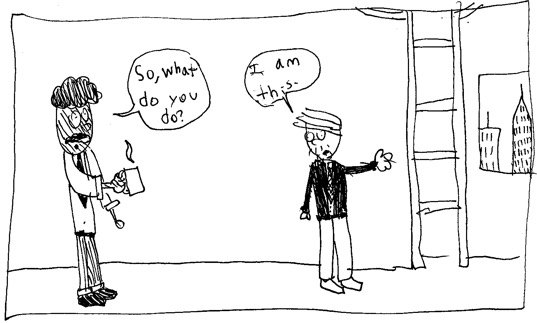When to stop ✋
Curious about navigating a fulfilling career in journalism? Join me Oct. 17 for the Explore Your Career River webinar and Q&A for journalists.
Sometimes it’s hard to know when to let go.
I once made my entire family wait for 45 minutes while I tried to get a slideshow running on our TV. You’d better believe I still get good-natured teasing about the Slideshow Incident whenever I get a bit too attached to pursuing plan A.
When it comes to our careers, it can also be difficult to know when to say when. There are two significant factors working against us: inertia and uncertainty.
Thanks for reading Explore Your Career River! Subscribe for weekly support and inspiration.
These are the same reasons that home renovation projects become money pits, or people stay too long in a bad relationship. In fact, The Wall Street Journal recently came out with a guide to How to Break Up With Your Career, looking at how the science of breakups can help you through falling out of love with your career (and avoid iffy rebounds).
There are deep psychological forces at work that make it harder and harder to let go once we’ve invested our time, money or emotions into something. This is why salespeople are trained to get the small “yes” before moving on to the bigger ask — once we’ve agreed to something, our brains are primed to justify that decision by continuing to pursue it. Otherwise we’d have to reckon with the fact that maybe it wasn’t such a good choice in the first place, and who wants to admit that?
The same phenomenon happens in our careers. We’re taught to define ourselves by our job titles, and the more we’ve invested in a certain career path, the harder it feels to change gears.
Even if we can recognize that inertia and uncertainty are making us hang on to a job that’s not meeting our needs, our response is often to try to do more. In fact, doing less, or stopping something altogether, can be a much more powerful tool.
To make time for important work, staff at the Milwaukee Journal-Sentinel update their “Stop Doing” list. This approach allows them to let go of work that doesn’t serve their core goals, even when it’s difficult.
What might your “stop doing” list look like when it comes to your career? Would you stop applying for jobs that would come with major tradeoffs you don’t want to make? Could you stop pursuing a degree or certification once you’ve realized it won’t help you get where you want to go?
Saying no is just as strategically important as saying yes. Embracing changes in direction over the course of your career means sometimes you’ll have to stop pursuing an outdated idea. It’s very hard to give ourselves permission to stop, in part because we understand perfectly what we will lose and it’s often unclear what we could gain. But it’s certain that we will never know unless we give ourselves the space to try.
Happy navigating,
Bridget
Thanks for reading Explore Your Career River! Subscribe for weekly support and inspiration.
🔗 Links
How to Break Up With Your Career (The Wall Street Journal)
How the Milwaukee Journal Sentinel focused on prioritizing with a “Stop Doing” list (Better News)
Flex your BICEPS 💪 (Career River)


Member discussion